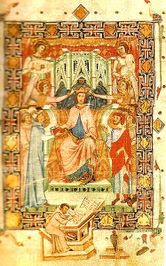Aderet became a banker, but was an expert on the Talmud and was treated as the leader of Spanish Jewry. He was rabbi of the Barcelona Synagogue for 50 years. People came from all over to hear him lecture on the Talmud. His fame spread to the point that questions were sent to him from all over Europe and the Mediterranean. Three thousand of these questions and his responses still survive.
He was a great defender of Judaism from external and internal forces. When the Dominican Raymond Martini read the Talmud and found passages that he believed supported Christianity, he also found passages that he said blasphemed. Martini wrote a document condemning the Talmud. Aderet wrote a response to this document. On the other hand, when a Muslim attacked Christian priests for falsifying the Bible, Aderet refuted his statements.
Aderet cared about authenticity, and "pure Judaism." Although he defended Maimonides when he got into trouble with authorities for some of his interpetations, Aderet did not approve of Maimonides' philosophic-rationalistic approach that saw reason as the best tool in understanding the divine rather than faith. In fact, Aderet was part of the beth din (the rabbinical court of law) in Barcelona that forbade men younger then 25 from studying secular philosophy or natural science, lest they be led astray by worldly thinking. (They were allowed to study medicine.) He was quite adamant about avoiding being led astray, writing:
In that city [Barcelona] are those who write iniquity about the Torah and if there would be a heretic writing books, they should be burnt as if they were the book of sorcerers.
Trying to enforce this ban created much hostility in his final years as rabbi. He was also sympathetic to those who wanted to study Kabbalah. but spoke out against people who took it to an extreme and considered themselves more than just men, namely people like Nissim ben Abraham of Avila and Abulafia.
Aderet died in 1310. Some of his students became famous in their own right. But I want to say something more about one of his teachers, Yonah Gerondi, who got involved in a religious controversy that led to an anti-jewish event I've mentioned before. I'll explain tomorrow.




